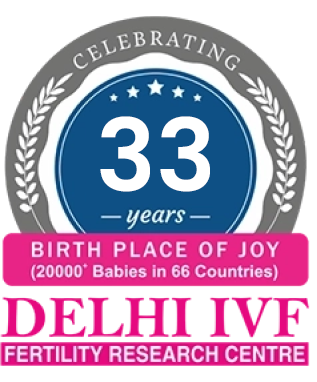
What is DOR? How is it related to infertility?
Diminished ovarian reserve (DOR) is the leading cause of infertility in women. It is characterized by a low number of eggs in a woman’s ovaries and/or poor quality of the remaining eggs, which boils down to impaired development of the existing eggs, even with assisted reproductive techniques. Limited knowledge about the reason behind low egg reserve.
Factors involved in DOR
- Age
- Genetics
- Environmental factors.
DOR is a poor prognostic factor in ART, because of a decline in the quantity and quality of oocytes. Age is the major contributor to the low-risk factor. Diminished ovarian reserve is noted in women in their mid to late thirties, but it may affect younger women as well. It is believed that there is an accelerated decline in the follicular pool at the age of 37–38 when it reaches below a critical of 25,000.
Diagnosing Diminished Ovarian Reserve
Diminished ovarian reserve is diagnosed by evaluating specific hormone levels through ovarian reserve testing. Blood tests are used to measure levels of key hormones including AMH and FSH. AMH can be measured anytime in the menstrual cycle, while FSH needs to be measured early on in the cycle (typically cycle day 3). AMH and FSH are among the most important hormones for assessing female fertility in many situations: for young women considering fertility preservation, for women who have been trying to get pregnant, and for women who are poor responders to IVF.
Some fertility centers also use antral follicle count (AFC) to measure functional ovarian reserve. Follicles are tiny sacs in a woman’s ovaries that hold the developing oocytes. Antral follicle count is measured by looking at the number of antral follicles in the woman’s ovaries using transvaginal ultrasound. This test is performed during the first week of the menstrual cycle, typically between cycle day 2 and cycles day 5.
However, we find it most useful to focus on age-specific levels of AMH and FSH. Many centers neglect to consider age when they evaluate hormone levels, which can lead to misdiagnosis (or a missed diagnosis). Other hormones used in the infertility testing workup include estradiol, which is important because this hormone suppresses the FSH levels. Some fertility centers also test inhibin B.
Symptoms of DOR or Low Egg Reserve
- Shortening of the menstrual cycles due to early follicle development and ovulation is an indicator of POR.
- Stopping of periods
- Missed Abortion
- Difficulty in Conceiving
Treatment of Diminished Ovarian Reserve (DOR) or Treatment of Low Egg Reserve
Treatment of Low Egg Reserve in women at Delhi IVF.
Most women who have been diagnosed with DOR (Diminished Ovarian Reserve) with high FSH levels or low AMH levels are advised by their reproductive endocrinologist that using donor eggs is probably an option left for pregnancy. However, that may not be always the case.
Diminished Ovarian Reserve can be treated in many cases. At Delhi IVF Research and Fertility Centre, we have ongoing studies on various applications of hormones/techniques to enhance the ovarian reserve or to use protocols that lead to successful treatment in women with DOR even without egg donation.
In many women, however, egg donation is the only resort to successful & healthy pregnancy. Delhi IVF has an excellent IVF egg donation program with consistently successful results over the last 30 years. We have one of the wide and excellent varieties of egg donors available for women, whose egg reserve is depleted, (all skin types/ Indian/ Caucasians/ different eye colors/ tall/ short / all religions), and those who are also extremely qualified.
We have successfully treated more than 5000 patients with Low Egg Reserve in the past 30 years and were able to successfully deliver a baby. Women with low egg reserve who cannot be treated also gained pregnancy through our Egg Donation Programme.
At Delhi IVF, we have developed age-specific hormone charts that enable us to be more accurate in defining the cause of infertility for women who are having problems getting pregnant naturally — as well as women who are poor responders to IVF. With a precise diagnosis, we can then provide highly personalized treatment.
Delhi IVF recommends testing for the FMR1 gene. This is typically associated with fragile X syndrome, and it has been known for a long time that some women with high CGG counts on this gene can develop premature ovarian failure. CGG counts on the FMR1 gene are predictors of future ovarian reserve.

 Your Journey to Parenthood Begins with us!
Your Journey to Parenthood Begins with us!